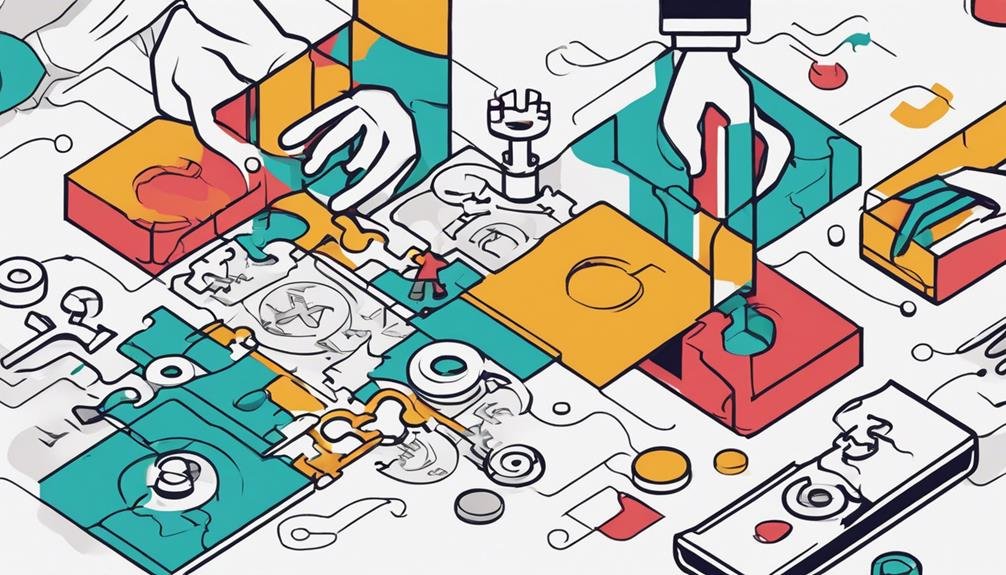To succeed in HR roles, you must master essential skills like effective communication, problem-solving, talent acquisition, compliance, and conflict resolution. These skills are crucial in navigating the ever-evolving business world. Additionally, continuous learning, networking, certifications, and expertise in HR reporting and cultural awareness will enhance your professional growth. Impacting job satisfaction, employee engagement, strategic planning, and organizational performance, honing these skills is key. Be prepared to adapt swiftly to changes, leverage technology, and lead impactful change in HR. This foundational knowledge will set you on the path to success in the dynamic field of human resources.
Key Takeaways
- Strong communication skills for effective interaction with employees and management.
- Problem-solving abilities to address complex HR issues and challenges.
- Talent acquisition expertise for recruiting and retaining top talent.
- Compliance and legal knowledge to ensure adherence to regulations and policies.
- Conflict resolution skills to manage and resolve workplace conflicts professionally.
Core HR Skills Overview

When considering a career in HR, understanding the core HR skills essential for success is crucial. Core HR skills encompass a wide range of competencies important for managing employee relations, recruitment, legal compliance, and organizational development. These skills include effective communication, problem-solving abilities, adept conflict resolution, talent acquisition expertise, strong compliance and legal knowledge, as well as proficiency in technology and data analytics. In today's HR landscape, the ability to leverage technology and data to make informed decisions and drive organizational growth is increasingly important. Besides, cultivating diversity, equity, and inclusion (DE&I) skills is essential for fostering a fair and inclusive workplace culture and supporting diversity initiatives within an organization. Additionally, possessing skills in organizational development and change management enables HR professionals to navigate shifts, promote resilience, and build a culture that embraces change. Mastering these core HR skills will not only enhance your effectiveness in the field but also contribute significantly to the success of your HR career.
Professional Development in HR
Professional development in HR is an essential aspect of advancing your career and staying competitive in the ever-evolving field. As HR professionals, continuous learning and networking play a critical role in enhancing your skills and remaining current in the industry. Acquiring certifications and developing expertise in areas such as HR reporting, cultural awareness, and wellbeing advocacy are necessary for career growth. Active listening, teamwork, and strategic workforce planning are also key components of your professional development journey. To thrive in the future landscape of HR, focus on honing skills in strategic planning, collaboration, advanced reporting abilities, and understanding the evolving business environment. Embrace a mindset of lifelong learning and seek opportunities to expand your network, as these actions will propel your career forward and equip you to tackle the challenges of tomorrow.
Impact of HR Skills

With the dynamic landscape of today's workplace, the impact of strong HR skills cannot be overstated. Enhancing your HR skills can lead to increased job satisfaction, confidence, and earning potential. Developing these skills not only paves the way for a fulfilling career but also plays a crucial role in improving employee engagement. Strong HR skills contribute significantly to strategic workforce planning, change management, and cost savings within organizations. Effective HR skills have the power to boost team morale, enhance organizational performance, and increase productivity. Additionally, impactful HR skills are essential for managing change, fostering employee engagement, and ultimately driving business success. By honing your HR skills, you are not only investing in your own professional growth but also making a valuable contribution to the success and sustainability of the businesses you work with.
Developing HR Skills
To progress in the field of HR, honing your skills is a continuous journey that opens doors to professional growth and success. Developing HR skills and competencies can be achieved through various avenues such as obtaining professional certifications, networking with industry professionals, and engaging in continuous learning opportunities. On-the-job training and mentorship play significant roles in enhancing your HR skills and staying current with industry trends. Continuous skill development is essential in HR to adapt to changing business landscapes and technological advancements effectively.
Building expertise in HR management, strategic planning, collaboration, reporting, and business understanding are essential for future HR professionals. Developing essential HR skills like communication, analytical thinking, and HR reporting can lead to career growth, increased earning potential, and improved job satisfaction. By focusing on these key areas and investing in your professional development, you can position yourself for success in the dynamic field of Human Resources.
Future HR Skills

Pioneering the path forward in the field of Human Resources necessitates a keen focus on acquiring and honing future HR skills that will be pivotal in maneuvering the evolving landscape of work environments. Future HR skills encompass expertise in HR management, strategic planning, collaboration, reporting abilities, and a profound comprehension of the business landscape. To thrive in the changing workforce and business environment, HR professionals must anticipate and adapt swiftly, align HR strategies with organizational goals, and drive impactful change.
With emerging technologies and data analytics shaping the future of HR, staying updated and proficient in these areas is paramount. The ability to leverage these tools to contribute effectively to organizational success will be a defining factor. Developing future HR skills will not only keep you ahead in the rapidly evolving workplace but also empower you to make significant contributions towards achieving organizational objectives. Embrace these skills to navigate the dynamic business terrain and lead impactful change in the domain of Human Resources.